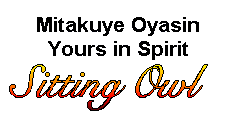|
Main
Menu
External
Pages
|
I Wonder
and
Jung’s
Shamanic Journey
into the Psyche
Now Playing: 'Round
Dance'
By: Free Spirit
I
Wonder
(Excerpt
from ‘Verse in Retirement (II)’ in memory of Uncle Fred.)
By: F.R. St.John
(From:
‘Earth People’ Volume 1 Number 6 )
I wonder, those who through the ranks have climbed
Give kindly thoughts to those they left behind,
And having reached the top – oft times with greed
Despise as rabble, those who were their seed.
And having got their all, they still seek more,
And selfishly decry the struggling poor
As they strive to gain a fairer crust,
E’re each and all return to dust.
And now, that through the ranks they’ve climbed
Join the groups that once they all maligned.
And, in oily arrogant debate,
Exert their pressure on the laws of state.
And so it’s been from history’s early dawn,
The fear – the greed – that makes the whole world mourn.
But, if the fear be lost, there’ll be no greed,
But when – and how – and who will give the lead?
Why not let heaven on this earth reside,
Why wait till death to there abode,
Why mystic worship, beyond our ken,
Let’s pay homage to our fellow men?
Then there’d be no ranks through which to climb,
No groups, no states, nor nations to malign,
No poor to struggle for a fairer crust,
I wonder if it shall be ever thus?
Jung’s Shamanic Journey
into the Psyche
(Excerpts
from ‘Memories, Dreams, Reflections’ By: C. G.
Jung)
Compiled and Entitled

(From:
‘Earth People’ Volume 2 Number 1)
[Seeking, from page 162]
I have frequently seen people become neurotic when they content themselves with inadequate or wrong answers to the questions of life. They seek position, marriage, reputation, outward success or money, and remain unhappy and neurotic even when they have attained what they were seeking. Such people are usually confined within too narrow a spiritual horizon. Their life has not sufficient content, sufficient meaning. If they are enabled to develop into more spacious personalities, the neurosis generally disappears. For that reason the idea of development was always of the highest importance to me.
[The spirit journey through the tunnel, from page 205]
In order to seize hold of the fantasies, I frequently imagined a steep descent. I even made several attempts to get to the very bottom. The first time I reached, as it were, a depth of about a thousand feet; the next time I found myself at the edge of a cosmic abyss. It was like a voyage to the moon, or a descent into empty space. First came the image of a crater, and I had the feeling that I was in the land of the dead. The atmosphere was that of the other world.
[Mythology, from page 153]
Since the essence of psychotherapy is not the application of a method, psychiatric study alone does not suffice. I myself had to work for a very long time before I possessed the equipment for psychotherapy. As early as 1909 I realised that I could not treat latent psychosis if I did not understand their symbolism. It was then that I began to study Mythology.
[Mythology, from page 213]
It is, of course, ironic that I, a psychiatrist, should at almost every step of my experiment have run into the same psychic material which is the stuff of psychosis and found in the insane. This is the fund of unconscious images which fatally confuse the mental patient. But it is also the matrix of a mythopoeic
[mythological Ed.] imagination which has vanished from our rational age. Though such imagination is present everywhere, it is both tabooed and dreaded, so that it even appears to be a risky experiment or a questionable adventure to entrust oneself to the uncertain path that leads into the depths of the unconscious.
[Personifying God and all images of the
unconscious, from page 211]
The essential thing is to differentiate oneself from these unconscious contents by personifying them, and at the same time to bring them into relationship with consciousness. That is the technique for stripping them of their power. It is not too difficult to personify them, as they always possess a certain degree of autonomy, and separate identity of their own. Their autonomy is a most uncomfortable thing to reconcile oneself to, and yet the very fact that the unconscious presents itself in that way gives us the best means of handling it.
[The science of the psyche, from pages 217 & 218]
When I look back upon it all today and consider what happened to me during the period of my work on the fantasies, it seems as though a message had come to me with overwhelming force. There were things in the images which concerned not only myself but many others also. It was then that I ceased to belong to myself alone, ceased to have the right to do so. The knowledge I was concerned with, or was seeking, still could not be found in the science of those days. I myself had to undergo the original experience in the soil of reality; otherwise they would have remained subjective assumptions without validity. It was then that I dedicated myself to service of the psyche. I loved it and hated it, but it was my greatest wealth. My delivering myself over to it, as it were, was the only way by which I could endure my existence and live it as fully as possible.
Today I can say that I have never lost touch with my initial experiences. All my works, all my creative activity, has come from those initial fantasies and dreams which began in 1912, almost fifty years ago. Everything that I accomplished in later life was already contained in them, although at first only in the form of emotions and images.
My science was the only way I had of extricating myself from that chaos. Otherwise the material would have trapped me in its thicket, strangled me like jungle creepers. I took great care to try to understand every single image, every item of my psyche inventory, and to classify them scientifically – so far as this was possible – and, above all, to realise them in actual life. That is what we usually neglect to do. We allow the images to rise up, and maybe we wonder about them, but that is all. We do not take the trouble to understand them, let alone draw ethical conclusions from them. This stopping-short conjures up the negative effects of the unconscious.
[Shaman the wounded healer, from page 242]
And just as the wounder wounds himself, so the healer heals himself. Significantly, in the dream the decisive activity is carried out by the dead upon the dead, in the world beyond consciousness, that is, in the unconscious.
[Integration and revelation, from page 317]
What happens within oneself when one integrates previously unconscious contents with the consciousness is something which can scarcely be described in words. It can only be experienced. It is a subjective affair quite beyond discussion; we have a particular feeling about ourselves, about the way we are, and that is a fact which it is neither possible nor meaningful to doubt. Similarly, we convey a particular feeling to others, and that too is a fact that cannot be doubted. So far as we know, there is no higher authority which could eliminate the probable discrepancies between all these impressions and opinions. Whether a change has taken place as the result of integration, and what the nature of that change is, remains a matter of subjective conviction. To be sure, it is not a fact which can be scientifically verified and therefore finds no place in an official view of the world.
[Truth, duality and quantum physics, from pages 177 & 178]
The pendulum of the mind oscillates between sense and nonsense, not between right and wrong. The numinosum
[numinous – the feeling of attraction and awe characteristic of man’s sense of communion with God and
religion. Ed.] is dangerous because it lures men to extremes, so that the modest truth is regarded as The truth and a minor mistake is equated with fatal error… Yesterday’s truth is today’s deception, and yesterday’s false inference maybe tomorrows revelation. This is particularly so in psychological matters, of which, if truth were told, we still know very little. We are still a long way from understanding what it signifies that nothing has any existence unless some small – and oh, so transitory – consciousness has become aware of it.
[From page 329]
I have also realised that one must accept the thoughts that go on within oneself of their own accord as part of one’s reality. The categories of true and false are, of course, always present, but because they are not binding they take second place. The presents of thoughts is more important than our subjective judgement of them. But neither must these judgements be suppressed, for they also are existent thoughts which are part of our wholeness.


Donations
If you would like to make a donation to Sitting Owl
please use this button.
|